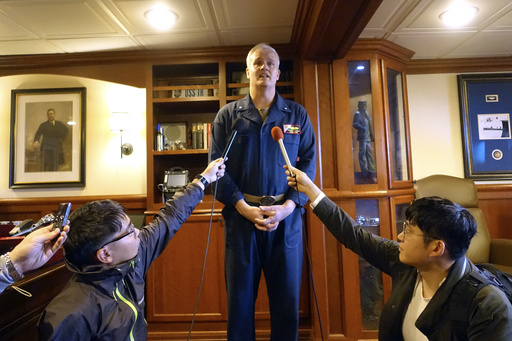ABOARD THE USS THEODORE ROOSEVELT (AP) — A U.S. carrier strike group led by the USS Theodore Roosevelt has held a two-day joint exercise with its allies Japan and South Korea as U.S. President Joe Biden met for talks with leaders from Japan and the Philippines at the White House. The military and diplomatic maneuvers are meant to strengthen the partners’ solidarity in the face of what they see as China’s aggressive military actions in the region.
A number of U.S. and South Korean guided missile destroyers and a Japanese warship joined the drills in the disputed East China Sea, where worries about China’s territorial claims are rising. The Associated Press was one of several news organizations allowed a front-row look at the drills.
Rear Adm. Christopher Alexander, commander of Carrier Strike Group Nine, said the three nations conducted undersea warfare exercises, maritime interdiction operations, search and rescue drills and work focused on communication and data sharing. He told journalists Thursday on the Roosevelt that these drills would help improve communication among the United States and its allies and “better prepare us for a crisis in the region.”
F/A-18E Super Hornet combat jets took off from the carrier’s flight deck, which also had anti-submarine MH-60R Seahawk helicopters. Journalists were flown more than an hour from Kadena Air Base, the hub of U.S. Pacific air power. Kadena is on Japan’s southern island of Okinawa, which is home to about half of the 50,000 American troops stationed in Japan.
“It is a busy time; there is a lot going on in the world,” Alexander said. “The significance of this exercise is we have three like-minded countries, three like-minded navies that believe in peace, security and stability in the western Pacific.”
In Beijing, the Chinese Foreign Ministry said its director-general of Asian affairs had met with a top Japanese Embassy official on Friday and expressed “serious concern and strong dissatisfaction” about Japan’s “negative moves” during Prime Minister Fumio Kishida’s meetings in Washington with Biden and Philippine President Ferdinand Marcos Jr.
That followed earlier Chinese statements that accused the U.S. and Japan of smearing China and urged them to stop undermining regional peace and stability, while saying China will “resolutely defend” its security and development interests.
The participation of Japan and South Korea in the joint exercise was another sign of improving ties between the sometimes wary neighbors. The two U.S. allies’ relationship has often been strained by the memory of Japan’s 35-year colonization of the Korean Peninsula. Washington has been pressing them to cooperate so the three partners can better deal with threats from China and North Korea.
This week’s huge parliamentary election defeat of the governing party of South Korean President Yoon Suk Yeol, who has sought better relations with Japan, could constrain his Japan-friendly efforts, but experts believe ties will remain stable.
The drills focused on improving the three nations’ joint response capability against North Korea’s increasing nuclear and missile threats, South Korea’s navy said in a statement. It said the navies conducted anti-submarine exercises to enhance their readiness against North Korean submarine threats and maritime interdiction training to practice blocking potential illegal transfers of banned weapons by the North.
The latest naval exercise is part of Biden’s work to deepen security and diplomatic engagement with Indo-Pacific nations. Biden invited Kishida and Marcos to the White House for their first trilateral talks Thursday, and has declared that the U.S. defense commitment to the Pacific allies is “ironclad.”
Tensions between China and the Philippines have risen over repeated clashes by the two nations’ coast guard vessels in the disputed South China Sea. Chinese coast guard ships also regularly approach disputed Japanese-controlled East China Sea islands near Taiwan.
Beijing has defended its operations in the South China Sea and blamed the United States for creating tensions. Chinese President Xi Jinping had a series of talks this week with senior officials from Vietnam, Russia and Taiwan.
The U.S.-Japan-South Korea naval exercises follow four-way drills held in the South China Sea, where Japan joined the United States, Australia and the Philippines. Participants carefully avoided mentioning China and said they were holding the exercises to safeguard a peaceful and stable Indo-Pacific.
A Chinese Defense Ministry spokesperson said Friday that China’s activities in the South China Sea are “justified, lawful and beyond reproach” and accused the U.S. of flexing its muscles in the region and building up anti-China cliques.
“These acts are irresponsible and extremely dangerous,” Senior Col. Wu Qian said in a statement posted online.
An area of long-simmering disputes, the South China Sea serves a key sea lane for global trade. Concerned governments include Vietnam, Malaysia, Indonesia, Brunei and Taiwan.
___
This story has been corrected to say that the drills took place over two days, not three.
This website uses cookies so that we can provide you with the best user experience possible. Cookie information is stored in your browser and performs functions such as recognising you when you return to our website and helping our team to understand which sections of the website you find most interesting and useful.
